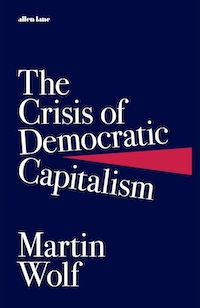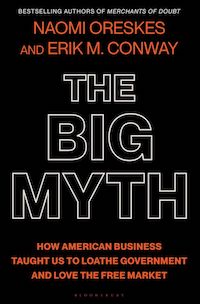Public ideas
Martin Wolf on the fragility of civilization and of democratic consensual political systems
With the passage of time our collective memories of the 1930s have faded. We don’t understand how easy it is for demagogues to exploit discontent and to destroy our fragile institutions – democratic consensual political systems and civilization itself.

That’s a message from Martin Wolf, Chief Economic Editor of the Financial Times, who discussed The crisis of democratic capitalism on Saturday Extra last week. (16 minutes). The separation of economic and political power has given our democratic societies energy and dynamism, but that system is under threat. Competitive capitalism, as extolled by Adam Smith and described in textbooks, is giving way to rentier capitalism, as a hereditary privileged class accumulates wealth, drawing income from invested financial wealth, without contributing to people’s wellbeing, and exercising increasing political power. At the same time demagogues are spreading fear and lies, in campaigns such as their “war on woke” and Brexit in his country, the UK.
In this regard he is particularly concerned about the direction of US politics, and he also warns about the ways the French and Indian political landscapes are developing. His message to all concerned with sustaining democracy is to appreciate that its preservation is an ongoing battle.
Wolf is author of The crisis of democratic capitalism.
An old but useful economic idea recycled
A reader has drawn attention to a short podcast by Jessica Gordon Nembhard, Professor of Community Justice and Social Economic Development at John Jay College, New York: Solidarity Economics. (12 minutes).
It’s hosted by the Institute for New Economic Thinking, but in fact Nembhard is talking about cooperation in economic activity, with many examples from the experiences of Afro-Americans who established formal and informal cooperative arrangements in times when racial discrimination was at its worst.
Her presentation is a reminder that economic activity creates wealth not only through competition – the obsession of neoliberalism – but also through social cooperation.
Freedom, as seen by big business
When businesspeople talk about “freedom” they are often referring to the freedom of corporations to go about their business unhindered.
The Visual Capitalist has a world map of “economic freedom”, based on countries’ adherence to the rule of law, market openness and labour and business freedom – freedoms that generally align with more liberal concepts of “freedom”. It also considers “the size of government”, implying that small government promotes economic freedom.

When we glance at the map we see a general correlation between economic freedoms and freedom in a wider context. The world’s democracies including Australia score highly.
When we look more closely we see that Singapore, a state that can hardly be described as a full democracy, comes in at top position, followed by Switzerland and Ireland, countries that do well for their own citizens but as tax havens compromise freedoms of the rest of the world.
Tellingly, however, the Nordic countries, all of which have high taxes, good public services and strong social security, all score more highly than the US or Australia.
That does not align with many businesspeople’s idea of freedom. They see government as an economic burden, while they ignore its contribution to funding and providing public goods, the provision of which is important for business to thrive. This point is taken up by Joseph Stiglitz in a Project Syndicate contribution: Who stands for freedom?, a review of the book The big myth: how American business taught us to loathe government and love the free market by Naomi Oreskes and Erik M Conway. Strong and well-funded government is a sine qua non for sustained business prosperity.